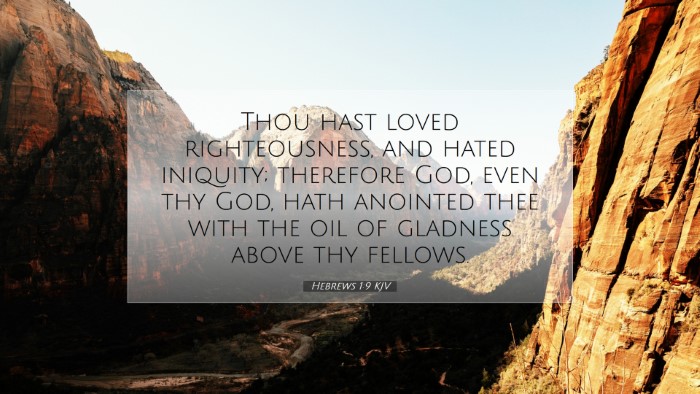Old Testament
Genesis Exodus Leviticus Numbers Deuteronomy Joshua Judges Ruth 1 Samuel 2 Samuel 1 Kings 2 Kings 1 Chronicles 2 Chronicles Ezra Nehemiah Esther Job Psalms Proverbs Ecclesiastes Song of Solomon Isaiah Jeremiah Lamentations Ezekiel Daniel Hosea Joel Amos Obadiah Jonah Micah Nahum Habakkuk Zephaniah Haggai Zechariah MalachiHebrews 1:9
Hebrews 1:9 KJV
Thou hast loved righteousness, and hated iniquity; therefore God, even thy God, hath anointed thee with the oil of gladness above thy fellows.
Hebrews 1:9 Bible Commentary
Commentary on Hebrews 1:9
Hebrews 1:9 declares: "You have loved righteousness and hated lawlessness; therefore God, Your God, has anointed You with the oil of gladness more than Your companions."
Contextual Overview
The Epistle to the Hebrews is a profound treatment of the person and work of Christ, aimed at encouraging believers in their faith. In chapter 1, the author emphasizes the supremacy of Christ over angels, establishing His divine nature and role as the ultimate revelation of God. Verse 9 serves as a climactic declaration of Christ's moral perfection and the consequent divine anointing.
Insights from Matthew Henry
Matthew Henry, in his commentary, focuses on the dual aspects of righteousness and lawlessness. He posits that this verse highlights Christ's moral attributes: His love for righteousness, which aligns with His divine nature, and His opposition to lawlessness, which reflects His mission to redeem humanity from sin.
Henry states that the anointing with "the oil of gladness" signifies not only joy but also the special endowment of the Holy Spirit upon Christ for His ministry. This joy, exceeding that of His companions, speaks to the total fulfillment found in obedience to the Father’s will.
Insights from Albert Barnes
Albert Barnes elaborates on the significance of Christ's moral character. He notes that loving righteousness and hating iniquity is essential for understanding the nature of Jesus as the Messiah. Barnes emphasizes that the contrast between righteousness and lawlessness underlines the necessity of holiness in the believer’s life, reflecting Christ’s character.
He underscores the expression "anointed with the oil of gladness," interpreting it as a metaphor for the abundant joy and favor bestowed upon Christ by the Father. According to Barnes, this anointing highlights the distinction between Christ and His companions, particularly in the context of His divine appointment and human experience.
Insights from Adam Clarke
Adam Clarke offers a thorough examination of the terms "loved righteousness" and "hated lawlessness," suggesting that these attributes are intrinsic to God’s character and, by extension, to Christ's identity. Clarke underscores the active nature of love for righteousness, which manifests in both His actions and His teachings.
Clarke explains the phrase "oil of gladness" as indicative of a divine joy that is uniquely assigned to Christ due to His fulfilled mission. He contrasts this with the joy experienced by others, which is often contingent and fleeting, whereas Christ's joy is rooted in His eternal relationship with the Father and His fulfillment of salvation's plan.
Theological Significance
This verse is rich in theological implications. The love of righteousness illustrates the ethical foundation of Christ's ministry and establishes Him as the archetype of holy living.
- Righteousness and Justice: Christ's love for righteousness speaks to His commitment to God's justice and the ethical framework of His teachings.
- Divine Anointing: The oil of gladness represents the joy of the Holy Spirit, emphasizing that Christ's mission is filled with divine empowerment and celestial joy.
- Contrast with Companions: The uniqueness of Christ's joy and anointing indicates His singular role in redemption history, setting the stage for understanding His divine authority.
Practical Applications
For pastors, students, and scholars, Hebrews 1:9 invites reflection on several practical applications:
- Emulate Christ's Righteousness: Believers are called to love righteousness as Christ did, fostering a life characterized by holiness and obedience to God.
- Understand the Source of Joy: Christians can find joy in their relationship with God, recognizing that true gladness comes from living a life aligned with His will.
- Resist Lawlessness: The need to stand against sin and injustice is paramount; followers of Christ are to actively oppose the lawlessness that pervades society.
Conclusion
Hebrews 1:9 serves as a powerful reminder of Christ's unique status as the anointed one, characterized by His love for righteousness and His profound joy. This verse not only establishes Jesus as the ultimate standard of moral excellence but also serves as a call for believers to aspire to His likeness. In embracing these truths, the church can be better equipped to reflect Christ's character in a world that desperately needs His light.


